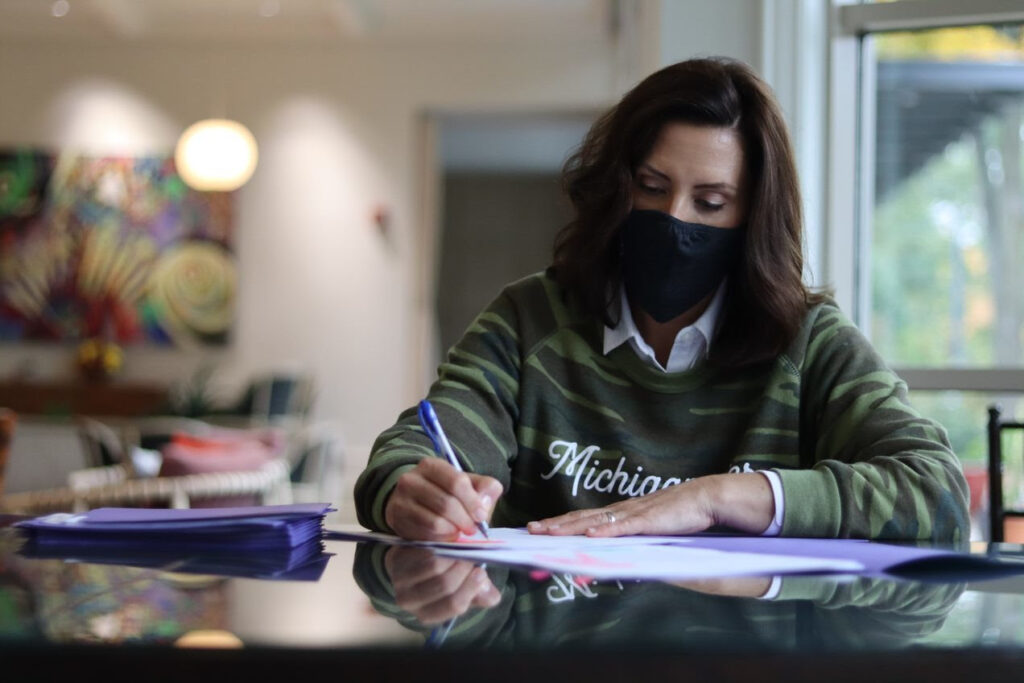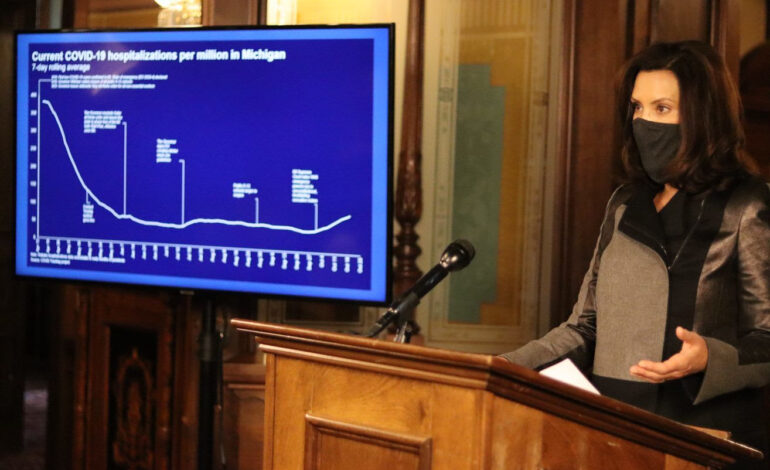LANSING — Governor Whitmer signed two bills on Thursday that protect workers from retaliation from businesses if they get sick from or are exposed to COVID-19, and protects businesses from COVID-19 related liability.
A trio of Michigan House bills (House Bills 6030-6032) say employers are required to allow workers who are exposed to COVID-19 or exhibit the symptoms of COVID-19 to stay home, and prohibit retaliation against employees for staying home when sick or exposed to the virus. The bills also provide a minimum damages award of $5,000 for violations. Awards may be higher than that in the event of more serious conduct or injuries.
The bills also protect Michigan businesses that comply with relevant COVID-19-related laws, including epidemic orders and rules. They make clear that when a business complies with all relevant COVID-19 related statutes, orders and rules issued by federal, state and local authorities, they cannot be held liable for a person becoming sick at the business.
Employers that comply with all relevant COVID-19 related statutes, orders and rules issued by federal, state and local authorities cannot be held liable under the Michigan Occupational Safety and Health Act (MIOSHA) for a worker becoming sick at work.
House Bill 6030 was sponsored by Rep. Tom Albert (R-Lowell). House Bill 6031 was sponsored by Rep. Tommy Brann (R-Wyoming) and Rep. Wendell Byrd (D-Detroit). House Bill 6032 was sponsored by Rep. Graham Filler (R-DeWitt).
“No Michigander should have to worry about going into work when they’re sick, especially during a global pandemic,” Whitmer said. “These bipartisan bills ensure crucial protections for our workers and businesses who do their part to protect our families and frontline workers from the spread of COVID-19.
“I look forward to more collaboration with the legislature where we can find common ground.”
The governor also signed other bills on Thursday, including one that protects consumers against surprise medical billing when they receive care at an in-network hospital, but see an out-of-network doctor. Such consumers’ insurance companies will now pay the doctor according to a formula specified in the bill.
Another bill provides extensions for the validity of certain permits, licenses and registrations issued by the secretary of state. Many of these permits were extended once already to Sept. 30 of this year. This second extension makes many permits, licenses and registrations valid until Dec. 11.

Whitmer signs several bills, including some that contain COVID-19 related protections for workers and businesses, Thursday, Oct. 22.
Sounding the alarm
I’m just going to be frank: Our numbers are not good. They’re moving in the wrong direction — Governor Whitmer
Midwestern states like Michigan have experienced a concerning upward trend in COVID-19 cases in recent weeks. Fear of a critical point at which mass hospitalizations quickly overwhelm local health systems has prompted governments to sound the alarm for increased precautions.
Cases have risen nationally from a recent low of 35,000 a day in mid-September to 60,000 on average over the past seven days. This is part of an upward five week trend. The U.S. has averaged 734 daily coronavirus deaths over the past seven days, still well below the 2,333 average at the height of the pandemic in April.
Whitmer addressed the state on Wednesday about this dangerous trend. She urged Michiganders to do everything they can to stop the spread before it reaches the kind of dangerous peaks that prompted a total lock down earlier this year.
“I’m just going to be frank: Our numbers are not good,” Whitmer said. “They’re moving in the wrong direction. We are in a dangerous moment, where there’s the possibility of it just becoming community spread that becomes out of control. We’re seeing that in a lot of our neighboring states. That’s what we’re trying to avoid.”
State COVID-19 data shows cases have doubled since the state’s Supreme Court decided that virtually all of Whitmer’s executive orders related to the virus were unconstitutional. Hospitalizations have increased nearly 80 percent in recent weeks, and are not restricted to the more populated southeast region of the state.
State and local health departments have since replaced those invalidated orders with their own emergency orders, which mirror the social distancing and mask requirements. The state surpassed 150,000 cases this week with more that 7,000 total deaths from the novel coronavirus.






Leave a Reply